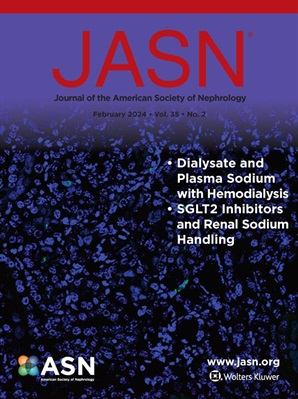急性肾损伤期间停用肾素-血管紧张素系统抑制剂和全因死亡率:目标试验模拟研究。
IF 10.3
1区 医学
Q1 UROLOGY & NEPHROLOGY
引用次数: 0
摘要
背景肾素-血管紧张素系统抑制剂(RASi)广泛应用于心血管疾病、糖尿病和慢性肾脏疾病患者,这些患者是AKI的高危人群。急性肾损伤(AKI)发作期间RASi的最佳管理证据尚缺乏。方法采用来自中国肾脏数据系统(CRDS)和重症监护医学信息市场IV (MIMIC-IV)数据库的顺序目标试验模拟框架进行多数据库队列研究。纳入接受血管紧张素转换酶抑制剂(ACEIs)或血管紧张素受体阻滞剂(ARBs)治疗至少90天的医院获得性AKI成年患者。主要结局是30天和180天的全因死亡率。调整后的累积发病率和风险差异使用加权合并逻辑回归模型进行估计。结果从CRDS数据库中共发现27,003例患者(中位年龄为70[58-78]岁;12972例(60%)男性)和MIMIC-IV数据库(中位[IQR]年龄,73[63-82]岁;2825[53%]男性)。在医院获得性AKI发生后2天内停用RASi的人试验中,调整后30天全因死亡率累积发生率低于继续使用RASi的人试验(4.36% vs. 5.91%),风险差异为-1.55%(95%可信区间[CI], -2.43%至-0.55%)。在MIMIC-IV数据库中,停用RASi始终与全因死亡风险降低相关,在分层分析和多敏感性分析中也观察到类似的有益关联。在这项研究中,在发现AKI的头两天内停止RASi与全因死亡风险降低相关。本文章由计算机程序翻译,如有差异,请以英文原文为准。
Discontinuation of Renin-Angiotensin System Inhibitors during Acute Kidney Injury Episode and All-cause Mortality: Target Trial Emulation Studies.
BACKGROUND
Renin-angiotensin system inhibitors (RASi) are widely used among patients with cardiovascular disease, diabetes, and chronic kidney disease, which are high-risk population for AKI. Evidence for the optimal management of RASi during an episode of acute kidney injury (AKI) is lacking.
METHODS
We conducted a multi-database cohort study using sequential target trial emulation framework from the China Renal Data System (CRDS) and Medical Information Mart for Intensive Care IV (MIMIC-IV) databases. Adult patients with hospital-acquired AKI who had been receiving angiotensin-converting enzyme inhibitors (ACEIs) or angiotensin receptor blockers (ARBs) treatment for at least 90 days were included. The primary outcomes were 30-day and 180-day all-cause mortality. Adjusted cumulative incidences and risk differences were estimated using weighted pooled logistic regression models.
RESULTS
A total of 27,003 person-trials were identified from the CRDS database (median [IQR] age, 70 [58-78] years; 12,972 [60%] male) and the MIMIC-IV database (median [IQR] age, 73 [63-82] years; 2825 [53%] male). The adjusted cumulative incidence of 30-day all-cause mortality was lower among person-trials with RASi discontinuation within two days after the hospital-acquired AKI than continuation (4.36% vs. 5.91%), with a risk difference of -1.55% (95% confidence interval [CI], -2.43% to -0.55%). Discontinuation of RASi was consistently associated with lower risk of all-cause mortality in the MIMIC-IV database, with similar beneficial associations observed across stratified analyses and multiple sensitivity analyses.
CONCLUSIONS
In this study, stopping RASi within the first two days of AKI detection was associated with a lower risk of all-cause mortality.
求助全文
通过发布文献求助,成功后即可免费获取论文全文。
去求助
来源期刊
CiteScore
22.40
自引率
2.90%
发文量
492
审稿时长
3-8 weeks
期刊介绍:
The Journal of the American Society of Nephrology (JASN) stands as the preeminent kidney journal globally, offering an exceptional synthesis of cutting-edge basic research, clinical epidemiology, meta-analysis, and relevant editorial content. Representing a comprehensive resource, JASN encompasses clinical research, editorials distilling key findings, perspectives, and timely reviews.
Editorials are skillfully crafted to elucidate the essential insights of the parent article, while JASN actively encourages the submission of Letters to the Editor discussing recently published articles. The reviews featured in JASN are consistently erudite and comprehensive, providing thorough coverage of respective fields. Since its inception in July 1990, JASN has been a monthly publication.
JASN publishes original research reports and editorial content across a spectrum of basic and clinical science relevant to the broad discipline of nephrology. Topics covered include renal cell biology, developmental biology of the kidney, genetics of kidney disease, cell and transport physiology, hemodynamics and vascular regulation, mechanisms of blood pressure regulation, renal immunology, kidney pathology, pathophysiology of kidney diseases, nephrolithiasis, clinical nephrology (including dialysis and transplantation), and hypertension. Furthermore, articles addressing healthcare policy and care delivery issues relevant to nephrology are warmly welcomed.

 求助内容:
求助内容: 应助结果提醒方式:
应助结果提醒方式:


